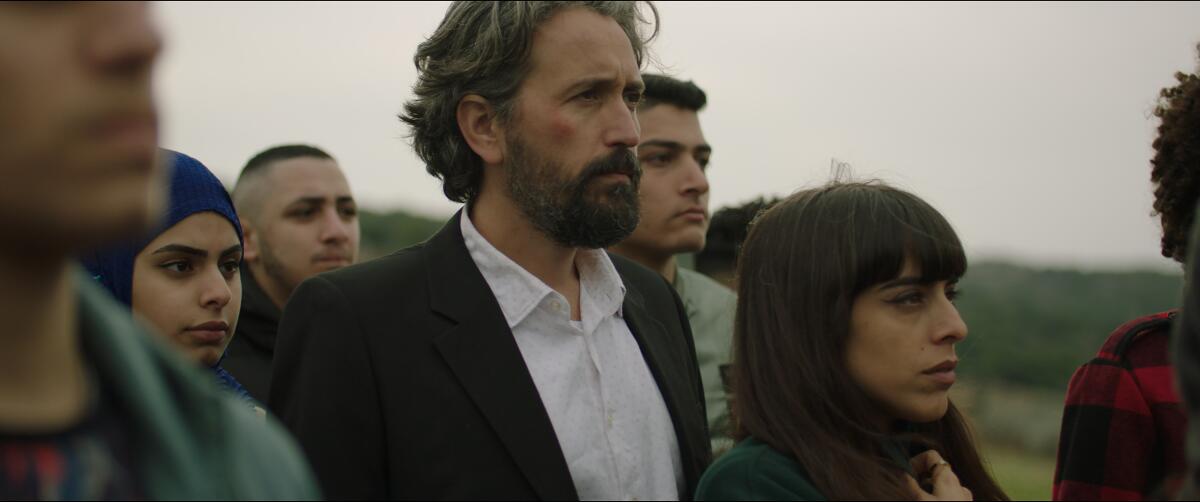Review: ‘Let It Be Morning’ explores a family’s dysfunction amid Israeli-Palestinian tensions

- Share via
“Let It Be Morning,” written and directed by Israeli filmmaker Eran Kolirin (“The Band’s Visit”), based on the 2006 novel by Palestinian author Sayed Kashua, is a low-key, wistful, wryly observational dramedy in which an Arab village finds itself on edge after a mysterious lockdown by the Israeli army.
Although this well-acted film, which was Israel’s official submission for the 2022 international film Oscar, is a bit slow-going, it presents a timely, pointed, at times cleverly satirical snapshot of Israeli-Palestinian relations. It also offers an often poignant look at a dysfunctional family at the center of it all.
For your safety
The Times is committed to reviewing theatrical film releases during the COVID-19 pandemic. Because moviegoing carries risks during this time, we remind readers to follow health and safety guidelines as outlined by the CDC and local health officials.
Sami (a soulful Alex Bakri), a Palestinian-born Israeli citizen working for a tech company in Jerusalem, has disdainfully returned with his wife, Mira (Juna Suleiman), and young son, Adam (Maruan Hamdan), to his remote hometown to attend the wedding of his younger brother, Aziz (Samer Bisharat), to Lina (Yara Elham Jarrar). But after the celebration, Sami and his family are stuck in the home of his parents, Tarek (Salim Daw) and Zahera (Izabel Ramadan), when the road out of town is closed by Israeli authorities. Not only is there no way out, but the village’s cell signals go down as does, eventually, the electricity. It’s all less a question of why has this happened than when will normalcy be restored?
The prevailing theory for the blockade is the presence of illegal West Bank Palestinians in the town, a factor which ends up highlighting a division in the Arab community. That one of those illegal residents (derogatorily dubbed “Daffawis”) is building a second home for Sami and his family next to his parents proves a socioethical conundrum for Sami, who didn’t want the house to begin with — his controlling father wanted it for him.
There’s a great deal of respect for the seemingly wise and level-headed Sami within his family and the community based on his younger days in the town, as well as the assumption that he’s cultivated a successful, more sophisticated life in the big city. But, as Sami will soon reveal, he’s not exactly the hero everyone thinks.
Still, as the person who may want to leave the town most — he fears he’ll miss an important work presentation and lose his job — Sami tries to spearhead an exit by sidling up to a swayable border guard (Kosta Kaplan). Later, he aligns with hapless old friend — and beleaguered taxi driver — Abed (Ehab Salami), to whip up a group protest against the siege.
But the film is less about escape and more about stasis, whether it’s remaining in one’s provincial hometown or staying in an unsatisfying relationship. The latter is especially well explored from several angles: Sami and Mira are on the rocks, partly due to the affair Sami thinks he’s keeping a secret; Tarek and Zahera are in a loveless marriage; it’s hardly clear sailing for Sami’s defensive sister (Arin Saba) and her twitchy husband (Doraid Liddawi); Abed pines for his estranged wife; and even newlywed Aziz already has misgivings about what he’s gotten into. These dynamics all give rise to some lovely, reflective, sometimes amusing conversations between or about the various pairings.
An early-on image of a flock of stubborn doves proves an apt, chuckleworthy metaphor for the should-I-stay-or-should-I-go sentiment that infuses the film.
The bonds of friendship are also considered, particularly between the snobbish Sami and the needy Abed, who are no longer the equals they perhaps once were. In addition, a possible reason that the town’s tough guy, Ashraf (Nadib Spadi), has remained loyal to childhood pal Sami adds an intriguing dimension to the story’s underlying theme of freedom versus repression.
'Let It Be Morning'
In Arabic and Hebrew with English subtitles
Not rated
Running time: 1 hour, 41 minutes
Playing: Laemmle Royal, West Los Angeles
More to Read
Only good movies
Get the Indie Focus newsletter, Mark Olsen's weekly guide to the world of cinema.
You may occasionally receive promotional content from the Los Angeles Times.








